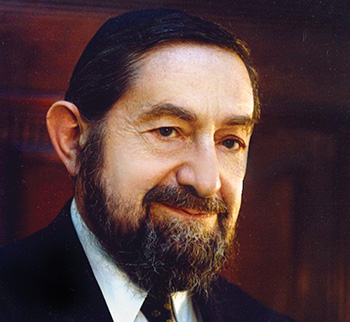Philip Reichmann, of the prominent and devoutly Orthodox Reichmann family, is the nephew of the late real estate magnate and philanthropist Paul Reichmann. To mark Paul’s first yahrzeit last month, the family is holding a tribute dinner on Dec. 15 at the Terrace Banquet Centre, in Vaughan. The CJN spoke to Philip about what his uncle is best remembered for, the causes he cared about and the lessons he’s given the community.
What is the purpose of the Dec. 15 dinner?
We’re doing this dinner as a tribute to Paul’s life. More importantly, it’s a tribute to his contributions to klal Yisrael – to the people of Toronto, Israel and the Jewish People more broadly.
In fact, the theme of the dinner is that Paul taught the world to give… We’re hoping around 1,000 people attend.
Paul taught people about generosity, tzedakah, about giving to others in need and supporting organizations that help fellow mankind and fellow Jews. That was his whole raison d’etre.
The dinner is open to anyone who buys a ticket. The host is Yeshivat Yesodei HaTorah, a school started over 50 years ago that today has roughly 500 boys from across the frum community. It’s a school Paul was particularly involved in. Ticket proceeds will go to the school.
What sorts of things was Paul best known for?
Paul was known for many different things. He was an incredible businessman, leader and individual. I think what people most remarked about him was his [commitment to] charity, generosity. In the ’70s and ’80s, [the extent to which he was giving to charity] was incomparable on the planet Earth. Nobody was giving tzedakah as the Reichmann family was in the ’80s. Today, there are many others who have followed in his footsteps, lots of extremely generous people who give tens of millions of dollars every year, but the Reichmanns did this when it was still a novel concept, and that’s really what we’re paying tribute to with this dinner.
What causes were most dear to Paul?
Yeshivas and schools were his priority. Ever since he was a young man, he was very active in fundraising and giving money to day schools and yeshivas – primarily in Toronto, but also around the world. That was his focus. He also gave millions to hospitals, to Mount Sinai, SickKids, Sunnybrook and hospitals in Israel.
Was it difficult for Paul to balance his commitment to Orthodoxy with his dedication to business?
That’s a great question, and in that one question you define his entire life. Paul was the ultimate example of someone who was extremely successful in both worlds – and they’re very different worlds. He was able to bridge them beautifully. He could have dinner with princes and prime ministers one evening, and rabbis and [Jewish] community leaders the next.
He was perfectly comfortable, and highly respected, in both worlds simultaneously. He was able to go to shul in the morning and put on tallit and tfillin and then go and have lunch with the prime minister. It was perfectly natural to him.
Did he ever feel pressure to work on Shabbat or the Jewish holidays?
Absolutely not. He wouldn’t do that for anything.
Would you say Paul was a big risk-taker?
There’s no doubt he was a risk-taker. You can’t be successful like that if you don’t take risks.
I think he also had a lot of faith in his mission, which I think he would say was to be as successful as he could possibly be, and then return it all back to the community.
He saw himself as a mere custodian of his wealth, as though it was only for his temporary keeping, before he pumped it all back into the community, into klal Yisrael. He felt that was the real reason for his success.
Did his grounding in Torah affect his application of business ethics?
I think his talmudic mind was an asset. He had an ability to see things differently from many people, perhaps from most. He had a perspective that was unique, unusual, and that was a strength that he was blessed with.
I think being a true adherent of Torah and Jewish values made him an ethical person. He was very careful, always, to be on the right side of ethics, to present al kiddush HaShem – to not offend the name of God by looking bad to anyone.
He tried very hard to put on the perfect presentation of what an Orthodox Jew should be: kind, caring, thoughtful, generous and honest.
Did he have interests the community may not have known about?
Business was his enjoyment. He was a very aggressive businessman and loved what he did. He loved being in the boardroom as much as anywhere else. But, he was also an incredible family man. He was home, I would say, more than most people of his level of success. He was also committed to his community beyond what, at the time, was the norm. Today, there are a lot of generous [business] people who invest time in the community, but in those days, in the ’80s, if you were a businessman, you were spending 24/7 on your business.
In addition to being a great businessman, Paul was a talmudic scholar. He was just as comfortable in the boardroom as in the beit midrash.
That’s what Paul Reichmann was, a careful blend of those two universes.
